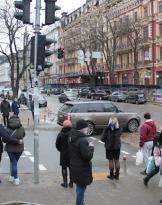We talk about it only when the peaks arrive, but the frost on the Baltic is actually a constant. Just look at the cold and gray table that bathes the hard beaches of Courland to get an idea. We are in Lithuania, at a stone's throw from Kaliningrad, the ancient Konigsberg of Kantian memory, passed in Moscow in the '45 and remained out of the news until Lithuania was in the USSR and Poland in the Warsaw Pact.
From the '91 onwards it has become a'exclave Russia, today among the most militarized lands in the world. When history and geography clash, it's a big trouble for everyone ...
We write from a pub, because going by bus from the Lithuanian Klaipeda to Kaliningrad today is impossible. From Nida, the last town before the border, no buses leave and it would still need a good visa at most 72 hours. It is easier to enter from the opposite side, the Polish side, from Mamonovo or Bagrationvsk, but even there it is cold weather.
Between local beers and suktinis with apples, there is time to reflect. The Dane river is frozen and with it the weather around. Walking around Klaipeda is strange: you find yourself halfway between the Middle Ages and Nordic fishing, in a strange polar calm surrounded by caterpillars and war planes.
Yes, that's right. A meter from here, Sukhoi Russians touch American ships; NATO threatens and displaces soldiers; Poland warms up, Finland too, Sweden turns out to be too neutral and unarmed, Russia tightens its shirts ... Here, everything looks like steel: even the pale gray blue sky.
Let's take a step back.
At the time of Rocky IV, for cinema and the collective imagination, Ivan Drago was Russian. In fact, he could have been born in Ukraine, Belarus, Latvia, Estonia, or any of the 15 Soviet republics. Not even the somatics helped us: the features, Slavic as well as Baltic, did not even exclude the whole of Asia, given the preponderance of Russians inside the USSR. That seventy-year dominance had changed demographic and social balances throughout the empire, unbeknownst to the Westerners and often to the Soviets themselves. That Stalin was Georgian was the exception that confirmed the rule. A bit like in the former Yugoslavia, where the Croatian Tito headed a Federation in reality dominated by the Serbs.
When the USSR broke up in '91, everything changed and the process of “derussification” in the Soviet republics developed with different forms and anger depending on the place. Everything depended on the traditions, on the cultural and demographic relationship between colonized and colonizers, on the real or presumed rancor and wrongs suffered for years.
In some countries the process of distancing from Russia has had little echo. This is the case of Belarus (de facto offshoot of Moscow) where it is aborted due to affinity, dependencies and economic constraints. Situation not too different for Armenia, Kazakhstan, Tajikistan, Kyrgyzstan and partly in Uzbekistan, where the derussification (the abandonment of Cyrillic for a return to Latin for example…) was more hysterical than substantial. The birth of the Eurasian Economic Community on the ashes of the Commonwealth of Independent States is basically the sublimation of an absolute principle: the elephant always weighs more than the mouse.
Here in Klaipeda, on the shores of the Baltic, everything is different though: between Livonia and Prussia, empires and Hanseatic leagues, this has always been borderland. Kaliningrad is called Konigsberg for the Germans, Karaliaučius for the Lithuanians, Krolewiec for the Poles.
Since 91, while many were celebrating in Vilnius, Tallinn and Riga, a whole generation of Russians suddenly found themselves without a homeland. The Soviet Occupation Museum in the central Ratslakumus in Riga, Latvia speaks volumes about the grievances of decades. Where the Orthodox Church was less influential (as in Lithuania for example) and could not mediate, it was tough. Little better in Estonia, where only a greater Russian presence prevented a real ethnic revenge.
So the world goes, one might say, especially when the borders dance and the flags change color. However, when it is complex, it would not be tragic if someone were not to blow on the fire.
It is very cold today in Lithuania. Many talk, but perhaps silence would be better.
(Continued)
(photo: NATO and the author)












